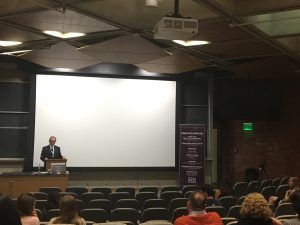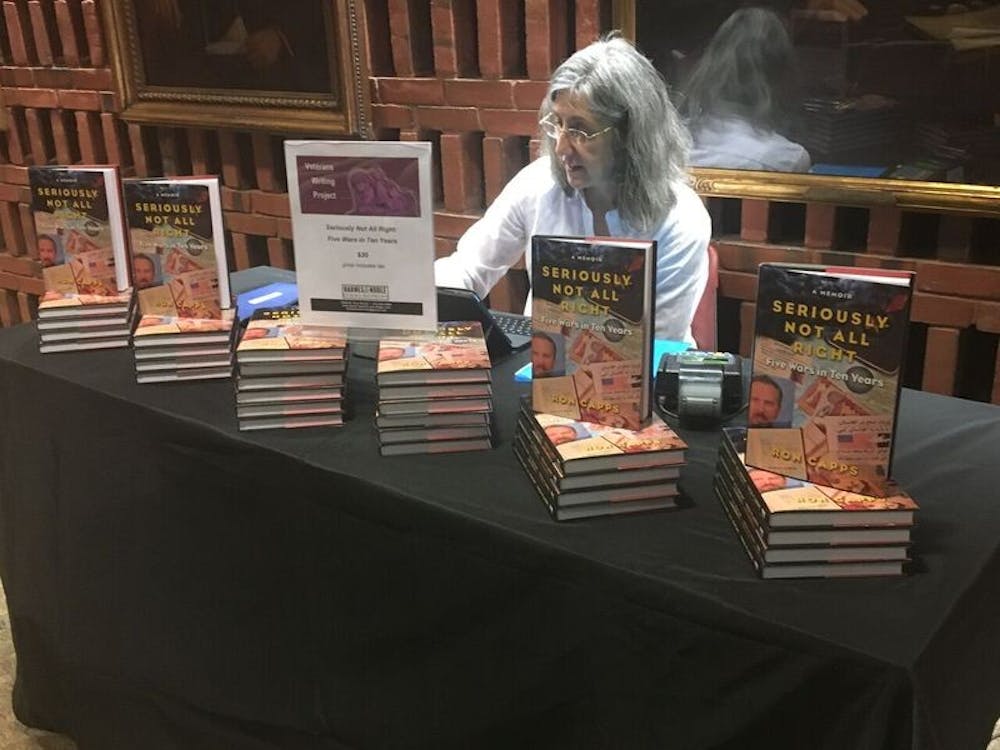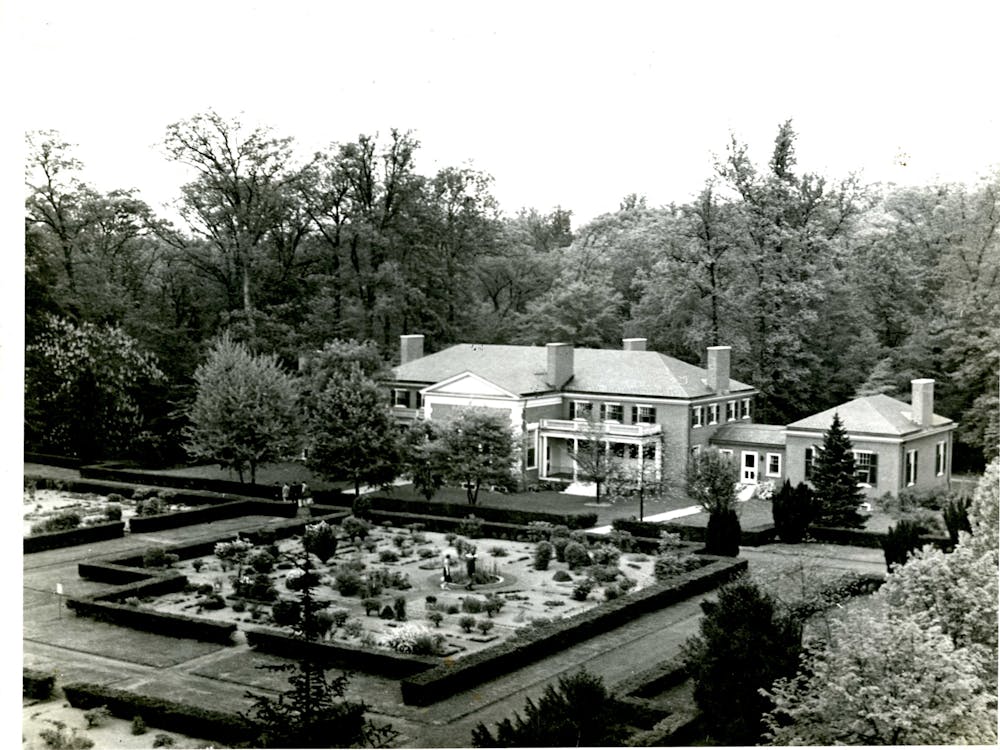Hopkins alum Ron Capps, founder and director of the nonprofit organization Veterans Writing Project (VWP), spoke in Mudd Hall on Wednesday as part of the Foreign Affairs Symposium (FAS).
VWP provides seminars and workshops in 18 different states to roughly 4,000 veterans, service members and their families to help them cope with their traumatic experiences.
For this initiative, Capps won the Anne Smedinghoff Memorial Award, given annually to commemorate the American diplomat and Hopkins alumna. She was killed while serving in Afghanistan in 2013.
A veteran of the U.S. war in Afghanistan, Capps served 25 years in the Army and Foreign Service. Over a span of 10 years, he was deployed five different times.
He has written extensively on his own personal struggle with post-traumatic stress disorder (PTSD). Capps founded VWP in 2011 while he was completing a writing program at Hopkins.
“I’d been using my GI bill benefits to attend graduate school here at Johns Hopkins for the second time, for something that could actually be considered somewhat frivolous: writing,” he said. “I really wanted to do something with this education, to do something important.”
He decided that he wanted to share what he learned in graduate school with others who had served in the military.
“I wanted to help all veterans and their family members find their voices,” Capps said. “To give them the skills and confidence they needed to tell their own stories. I wanted to help those who were struggling with PTSD, to understand that they weren’t alone. And that writing could be their road home.”
He quoted segments of Oliver Wendell Holmes’ 1884 Memorial Day speech, “In Our Youth Our Hearts Were Touched With Fire,” where Holmes emphasizes the importance of survivors bearing witness to the lives and deaths of those killed in war.

“Holmes tells us that warriors have a responsibility to bring back this report,” Capps said. “To memorialize those who can no longer speak for themselves. What’s implied in this idea is that those of us who sent these young men and women to war have a responsibility to listen to these stories, to listen and to learn what was done in our names.”
Capps said that aside from empowering people to tell their stories, VWP helps veterans make sense of their experiences. He referred to British writer and pacifist Vera Brittain, who is known for her memoir Testament of Youth and spent the First World War just behind front lines as a nurse.
“Vera teaches us that we must all seek to create something of value in our lives,” Capps said. “I think it’s an important lesson for everyone to take to heart. This is not just a lesson for common veterans. It’s not just for veterans. Each of us should seek to create something of value, something true and hopeful and useful in the events of our lives.”
He then went on to compare Brittain to Smedinghoff, saying they both strived to better others’ lives.
“Anne wanted to create something of value in her life,” Capps said. “The proof that she did is that we are all here honoring her memory tonight. Anne’s legacy, like that of Vera Brittain, is one of courage, of service to others and of seeking peace.”
Capps went on to read excerpts from his memoir, Seriously Not All Right: Five Wars in Ten Years, where he describes a close brush with suicide and feeling obliged to hide his trauma to continue his military services.
“I had my bosses fooled, I had my family friends fooled,” he said. “I had pretty much everybody fooled because I wanted to be there. I wanted to be doing this work.”
He explained how conventional therapy proved ineffectual for him, while writing helped him control his trauma.
“I quite literally wrote my way home,” he said. “I used writing to get the images of the dead and the dishonored out of my head and onto the page where I could control them. Either you control the memory or the memory controls you.”
Noting that therapists use writing in their practices, he expressed his desire for writing therapy programs in American colleges and universities, suggesting that Hopkins should act as a pioneer.
“We have one of the top rated hospitals in America, we have the number three rated medical school in America,” he said. “We have the Writing Seminars, that is one of the two top M.F.A. programs in America. Wouldn’t you think this is the place to begin the master of arts and science in writing therapy program?”
Freshman and FAS programming associate Kiana Boroumand appreciated the way Capps’ speech highlighted ways writing could be used.
“I’m a big believer in writing as a healing method, and I think that’s also not talked about,” she said. “So we have a stigma [around] mental health care, which is so important in all spheres, but we also have a stigma around the liberal arts and what the role of writing is.”
Junior Mary Gronkiewicz, who comes from a military family, felt the talk was relevant on a personal level.
“I remember being little and my grandpa, my parents talking about people they knew who struggled with PTSD, who struggled with other things, who, for a lack of a better word, had to suck it up and hide it under the table a little bit,” she said. “For me, organizations like this can do a lot of good and really help change the way we think about mental health, not just for veterans, but for other people who have experienced mental trauma.”
Junior Isabella Bowker was interested in learning how non-profit organizations like VWP developed.
“This isn’t a perspective I encounter on a daily basis, and I’m really interested in the mechanisms behind social movements,” she said. “I think his experience coupled with the little nitty gritty details on how they set up this really effective organization to me is interesting as someone who wants to get into working with non-profits in the future.”























Please note All comments are eligible for publication in The News-Letter.